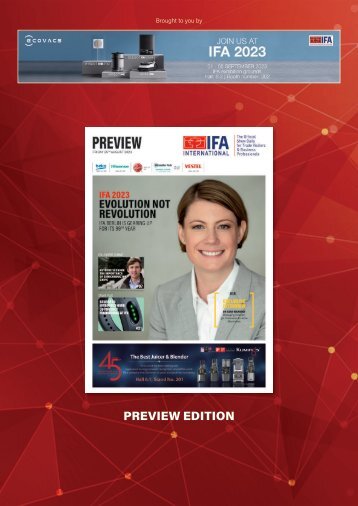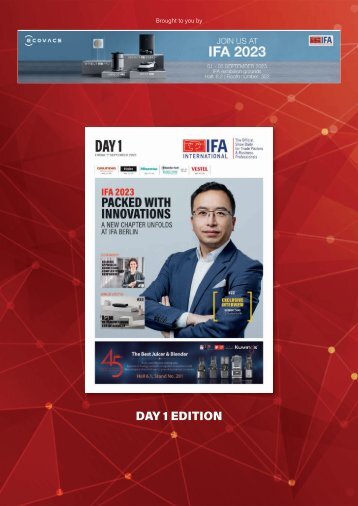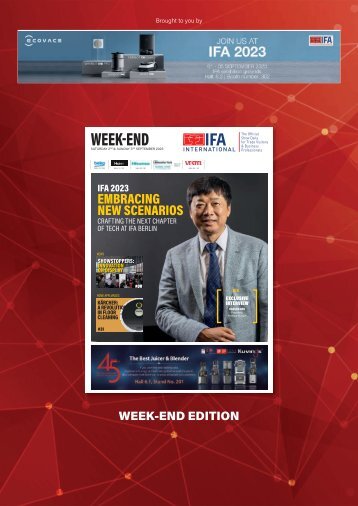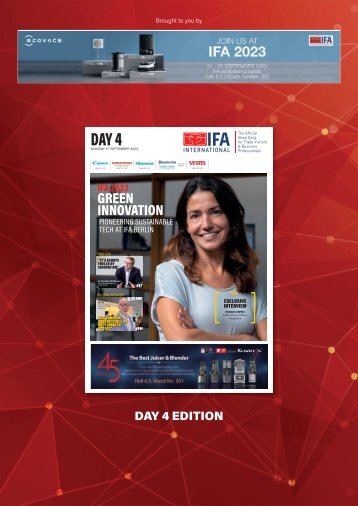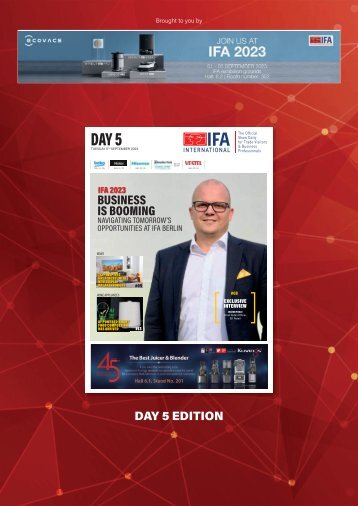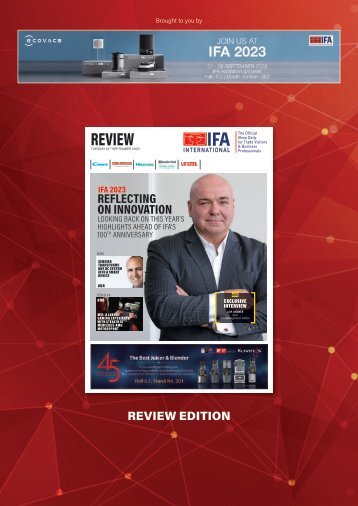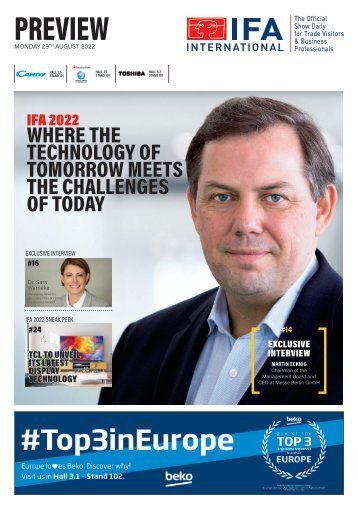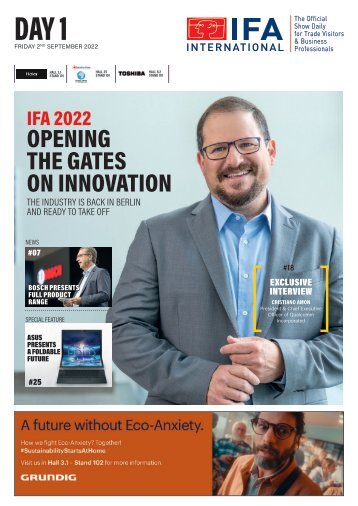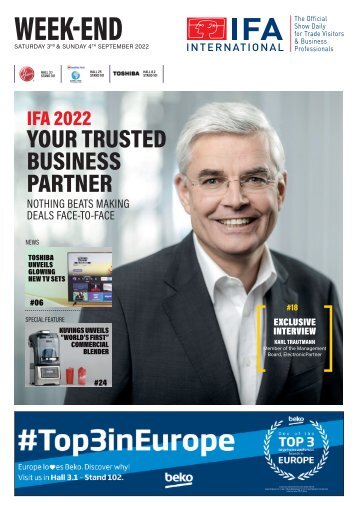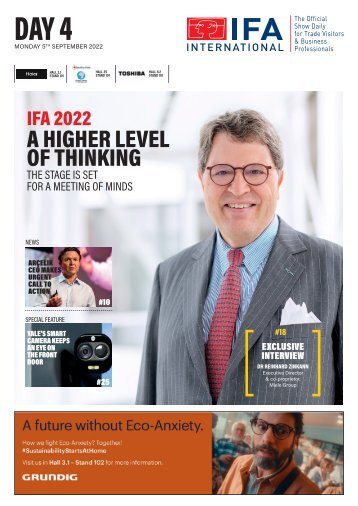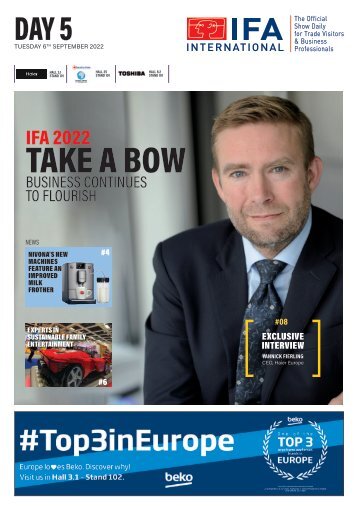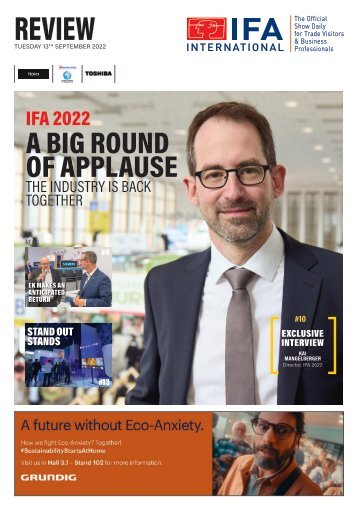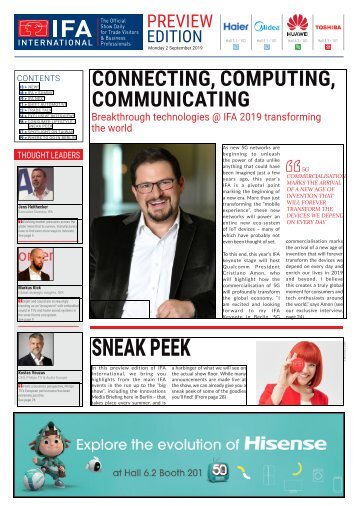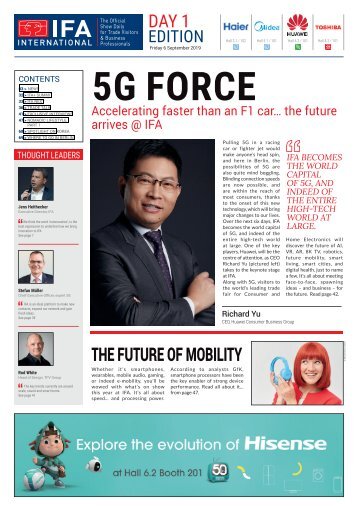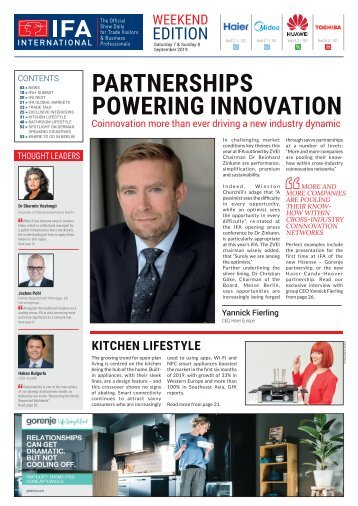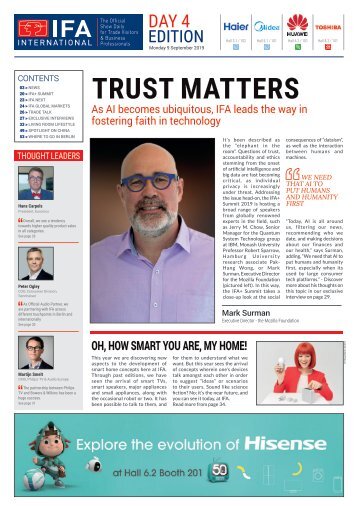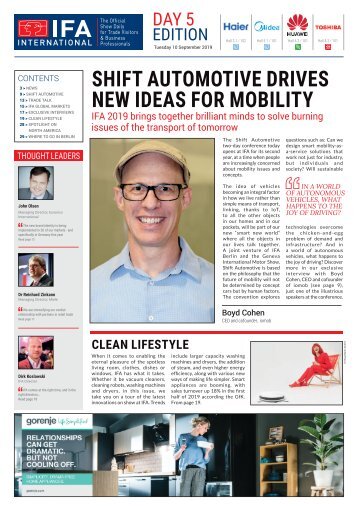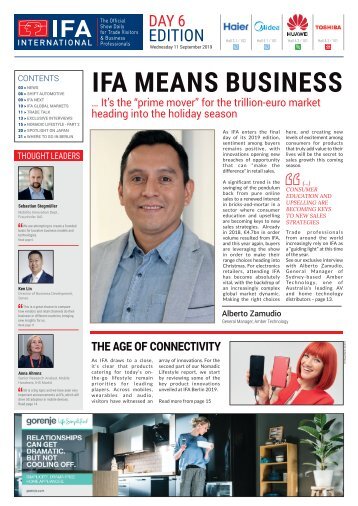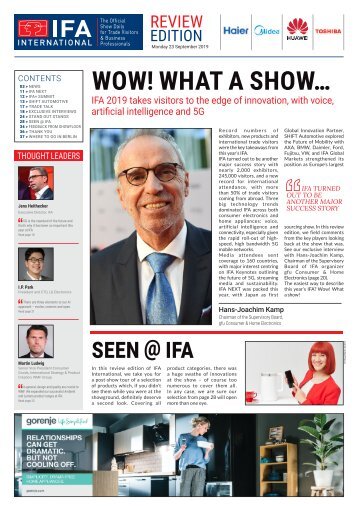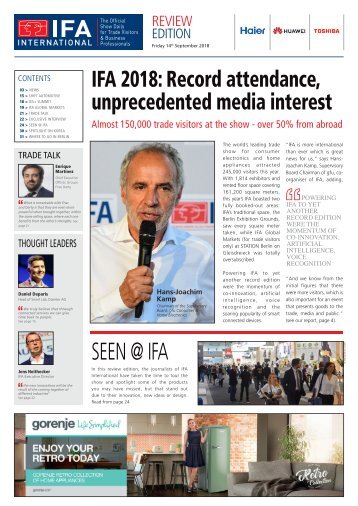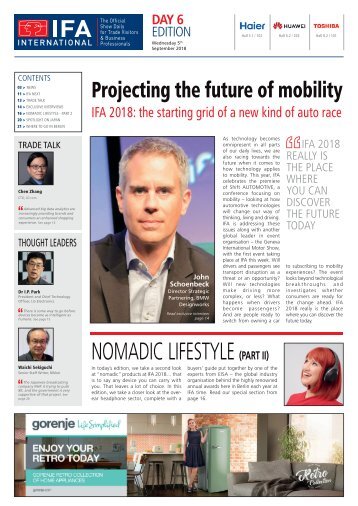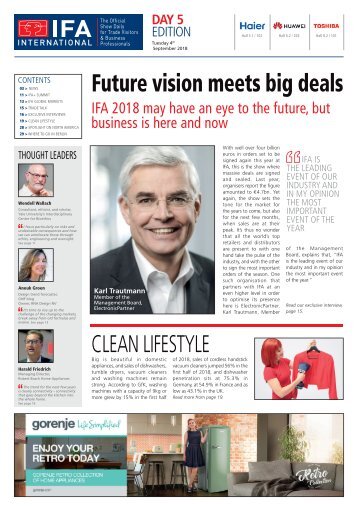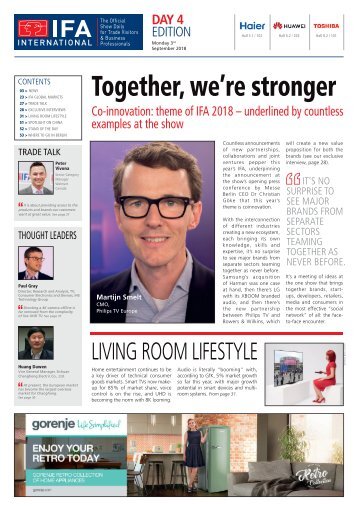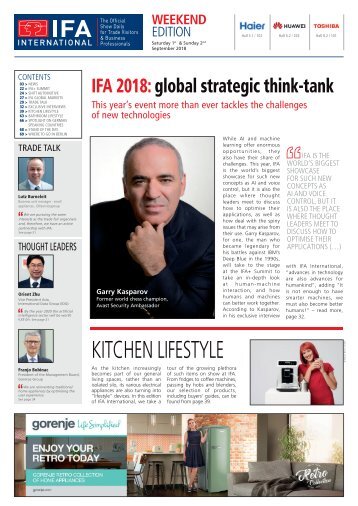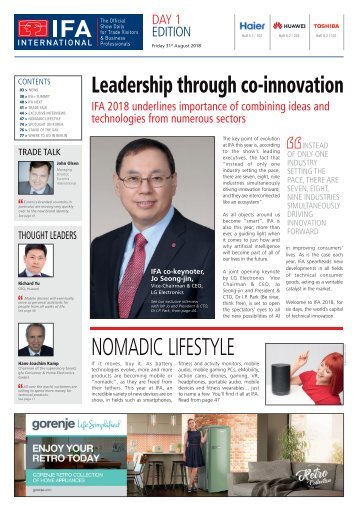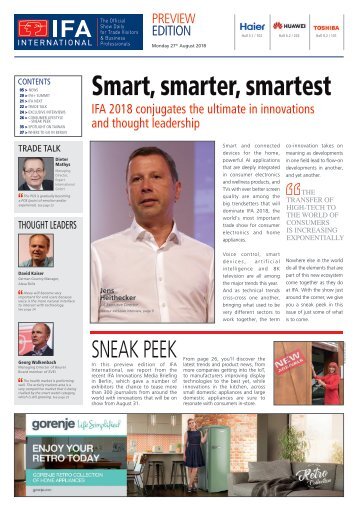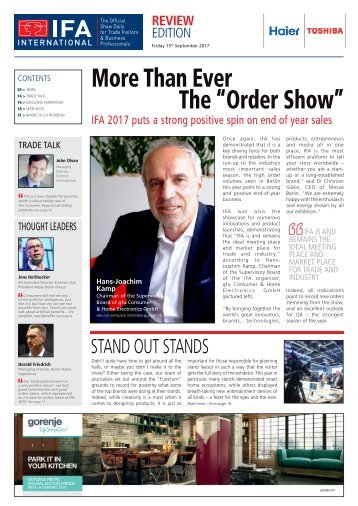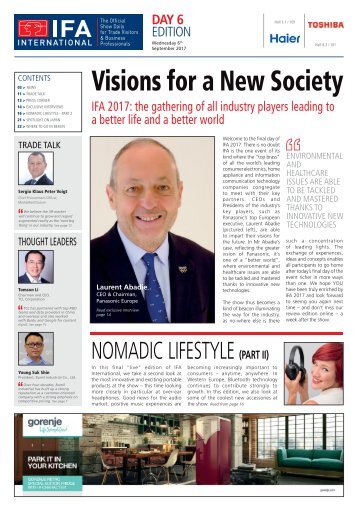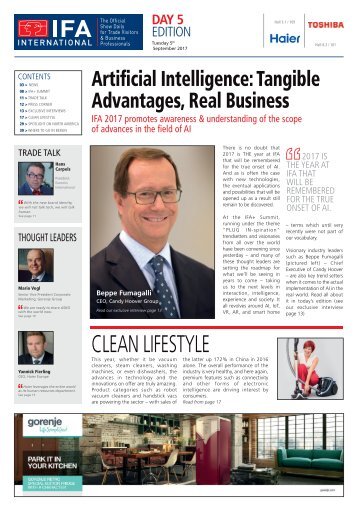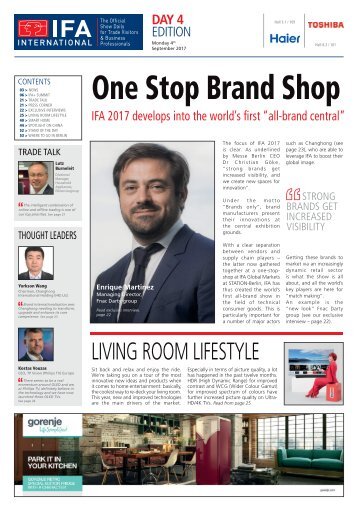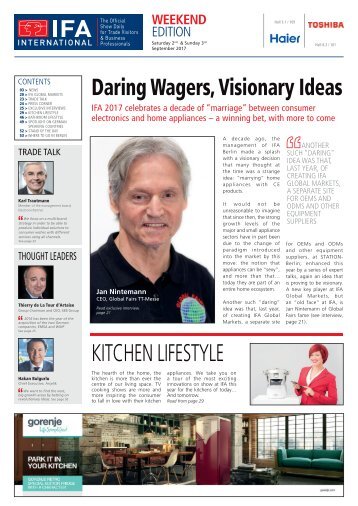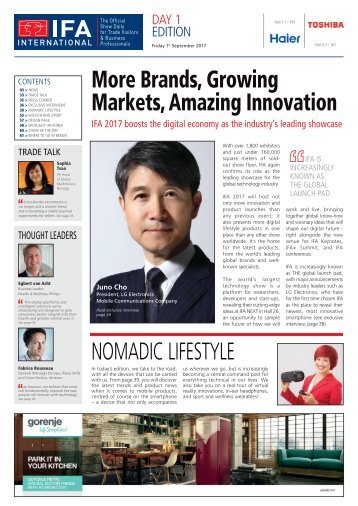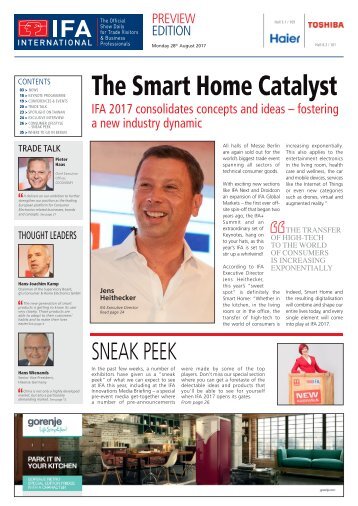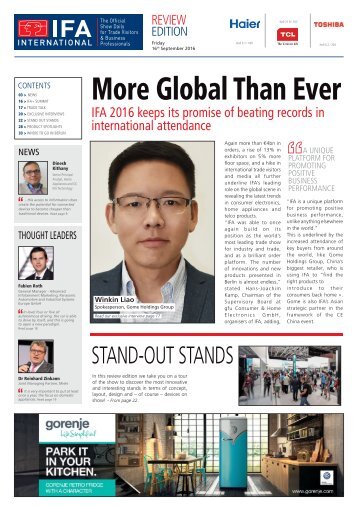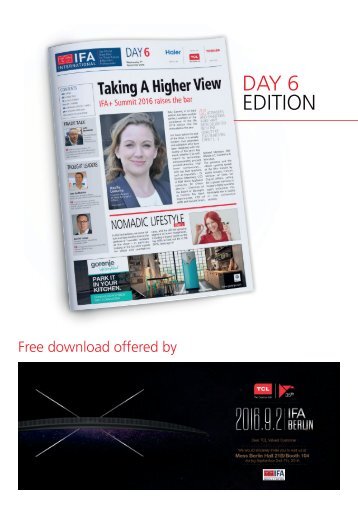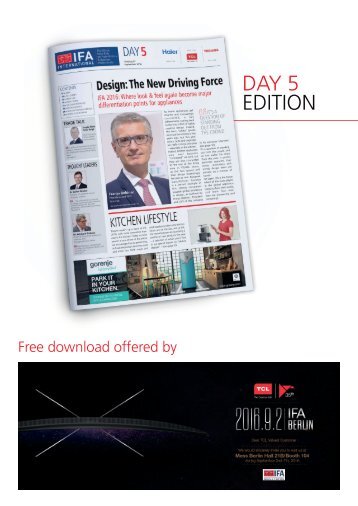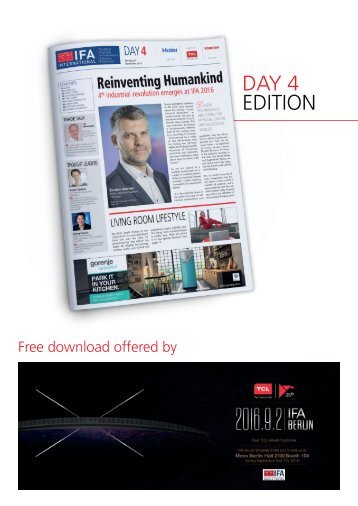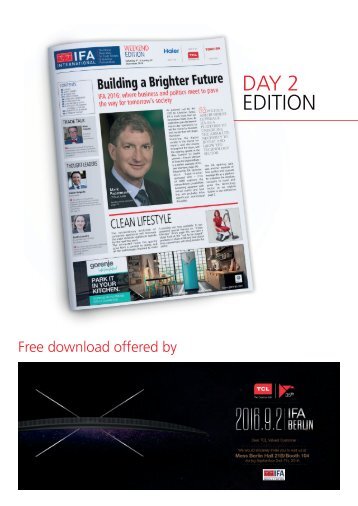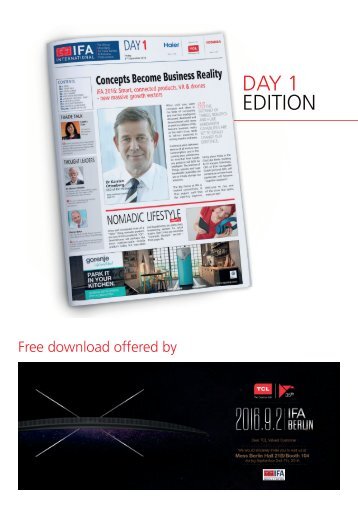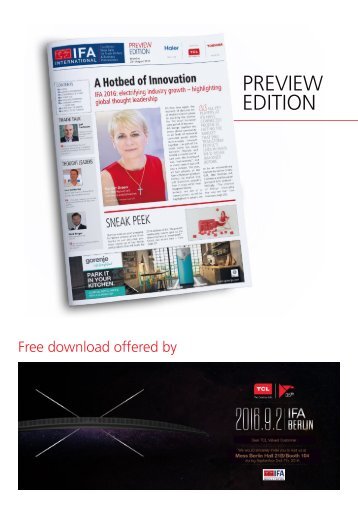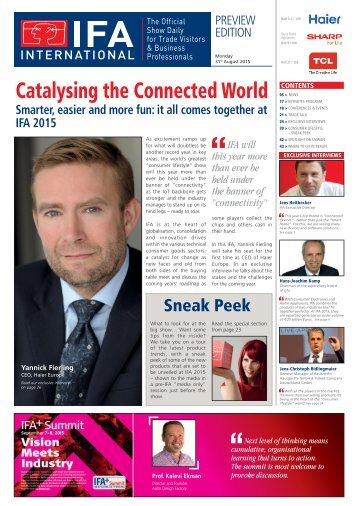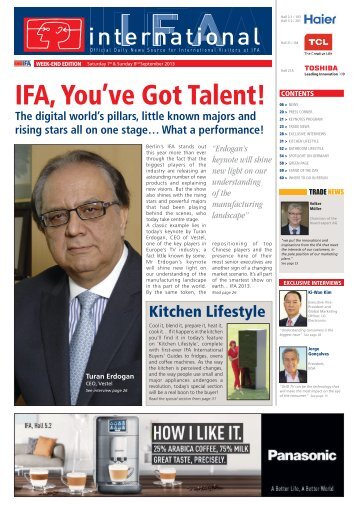
Week-end Edition - Day 2 & Day 3 - IFA International
- Text
- Products
- Berlin
- August
- Appliances
- Digital
- Consumer
- Features
- Electronics
- Germany
- Display
- Www.cleverdis.com
MEET THE VISIONARIES Dr
MEET THE VISIONARIES Dr KURT-LUDWIG GUTBERLET CHAIRMAN AND CEO BSH (BOSCH UND SIEMENS HAUSGERÄTE GMBH) A TASTE OF THINGS TO COME By Richard Barnes Keynote Saturday, 30th Hall 7.1a International Keynote Area 9h45 As Home Appliances are integrated into IFA for the first time this year, this exciting and growing market segment is also represented on a high level in the international keynotes. Dr. Kurt-Ludwig Gutberlet, leading German White Goods Manufacturer BSH’s Chairman and CEO, will be holding saturday’s keynote. IFA International Editor-in-Chief Richard Barnes met with Dr Gutberlet for an exclusive “pre-keynote” interview…. First we would like to talk about the 2 main axes at the heart of the philosophy of BSH. One is developing added value through performance, convenience and user friendliness. The second is environmental consciousness. Can you tell me how the company’s actions and developments are working towards these goals? Well obviously Bosch and Siemens being our main brands for the BSH group, both brands stand for innovation. If you look at patent statistics in Germany, Bosch and Siemens are ranked number 1 and number 2 in numbers of patent applications. BSH as a subsidiary of both companies has the 10th position overall in patent applications in Germany. So innovation has been the core of the two brands and we have stuck to that strategy and it’s fair to say our company stands for innovation in home appliances. For the environmental, excellence has been an element in our industry for a couple of years now. It has been driven since the first oil crisis, with people understanding that home appliances use a lot of energy, and that this should be reduced. And it has become a real competitive issue. It’s not so much about ethics or ambitions of managers; it has become a really essential part of white goods. If you are not efficient in water or energy consumption, you are not going to succeed in the market unless you have the strategy to be price leader. How heavy is this requirement? In new projects that we discuss, it can be easily 50% of the discussion. We look at it today in a more global way. It’s not just efficiency in using the product, but the entire life cycle. The key is to further reduce consumption with each new generation. At the IFA show, we will be showcasing new dishwashers and one key element of these products will be an unrivaled low level of water and energy consumption. We have innovated a new drying system, which we will present for the first time at IFA, which uses very, very little energy. So this gives you an idea on how competition is in white goods, which is very different from CE goods… it all revolves around energy and environmental friendliness. How important is it for companies and the industry to take these environmental challenges seriously? Do you think we need to act urgently? I would say that there are 2 aspects. First is the competitive aspect, which focuses on energy savings because for the consumer it means costs savings, so it’s a very rational thing. The environmental sustainability factor is becoming more and more important, but not because the customers are requesting it… It’s because the people inside the company ask for it. If you talk to young executives, the point that they mention the most is that they think our company should take care of the environment. Young executives place a lot more emphasis on this aspect and if you are good at that, you will attract better people in the future. Consumers like the idea of climate protection, but are not necessarily willing to spend extra money for it. The company is continuing to do extremely well and I saw in May you again had record sales. How is the company weathering the current economic climate however? Is it changing your roadmap? This is not affecting our strategy or roadmap. What it does is affect our operations this year in some specific countries. The economic climate is more difficult in some zones than others. Of course, it’s difficult in North America, but also in Great Britain and Spain. These are the 3 main countries where we feel a slowdown in economic activity, and especially building activity, which directly effects white goods. In many other countries, though – Germany, France, Eastern Europe and Asia – the economy is healthy, even booming. Of course, BSH is a market leader in Germany and Western Europe. Other parts of the world are different. Which areas of the world are you pushing apart from Europe? The biggest investment our company now has is clearly in China. It is a booming market and we have enjoyed a good position in China for over 10 years. We have invested heavily in new capacity. Our facilities in China produce goods for the Chinese market, not for importing back to Europe. The market is booming and we are serving it very well. In the US, there is also a dramatic change in the market towards energy efficient products. The perception had been that Americans didn’t care about energy efficiency, but our observation is that they now do. We are bringing high efficiency washing machines and dishwashers 16 www.ifa-international.org IFA International • Saturday, 30 th & Sunday, 31 st August 2008
MEET THE VISIONARIES to the market and it is very open to energy efficiency. The market is very open to embracing new concepts. How quickly are sales in that market increasing? Well we have in the past 4-5 years doubled our sales in the US. We have also established onsite production sites for white goods. You have to produce close to the market, because the products are bulky and you don’t want to ship them over the Atlantic. In China, it’s the same story. We develop products for the local market with European technology and this is very successful. I’ve noted that your spending on R&D as part of the overall budget has been growing. Is this trend going to continue? Absolutely, it will continue for a number of reasons. First, home appliances are not global products. If you expand your business to new markets, you have to invest in products that are designed for those markets, and thus you have to add R&D resources. At the same time, we cannot stop doing R&D in our key home market. We need to innovate in our home country too, so automatically you will see an increase in R&D spending. How do you view the move by IFA to include white goods? Obviously we appreciate it a lot because the entire electrical retail sector, which is a major channel of sales for us, will be there. There is a common retail audience between CE and white goods. More than 50% of our sales go through this channel so this is very attractive and IFA is a well introduced fair, has a great brand name and not only attract Germans, but international retailers around the world. CE is very digitally driven… There is a lot of innovation on that side. In our case, we can bring a lot of “home lifestyle” to IFA. “Home” is of course more than just watching TV or listening to music. If you think of one issue we are going forward is coffee. It has become very emotional worldwide. So I think we will see wonderful lifestyle products in the area of coffee that can also bring more emotion. A washing machine is a necessity, but coffee or cooking products bring out a lot of emotion in people. Cooking is becoming a trend. So this is a very interesting topic and this can add an interesting twist to IFA… for the consumers and the retailers. What do you think are the biggest challenges facing your companies now? We are an industry that is very material intensive. Our source materials are currently under a tremendous amount of inflationary pressure. Steel prices are rising 60% year on year, which we have never experienced before. This puts a lot of pressure on our industry and will eventually trigger price increases. This is not easy to bring to the market, because competition is very fierce. Retail is consolidating, so it’s not an easy game, but it is a situation we have to handle. Are the Korean manufacturers becoming a thorn in your side? In Europe they are not very visible yet, but they are serious competitors. That’s okay because I think that they are trying to bring innovation and good styling. It’s not a cheap product approach, but one of innovation. As the French say “la bonne guerre”… this industry is highly competitive. You can see it in the prices every year. Price erosion is not as dramatic as CE products, but nevertheless it is still very competitive. Any new competitor is welcome and if they bring innovation to the market it can even help the business. Hall 3.1 / Stand 203 IFA International • Saturday, 30 th & Sunday, 31 st August 2008 www.ifa-international.org 17
- Page 1: international Official Daily News S
- Page 5 and 6: NEWS we have been put in charge of
- Page 7: NEWS DRIVING FORCES RAINER HECKER C
- Page 10 and 11: Blu-ray Disc ® is changing DVD the
- Page 13 and 14: FLASHBACK TO KEYNOTES Andrea Ragnet
- Page 15: MARKETS & TE CHNOLOGY TRENDS THE DU
- Page 19 and 20: MEET THE VISIONARIES SIMON KANG PRE
- Page 21 and 22: FEATURE INTERVIEW EDDIE YEO EXECUTI
- Page 23 and 24: PRODUCT TRENDS FIVE OF THE BEST FRO
- Page 25 and 26: The world’s first 200 Hertz LCD T
- Page 27 and 28: PRODUCT TRENDS HAIER IN BI-MODE AND
- Page 29: THE GREEN PAGE STRIVING FOR ENVIRON
- Page 32 and 33: HOME APPLIANCES @ IFA THE LOGIC IS
- Page 34 and 35: Leading brand names in the consumer
- Page 36 and 37: You expect the best - luckily for u
- Page 38: GOING OUT Regent Hotel. Once inside
Inappropriate
Loading...
Mail this publication
Loading...
Embed
Loading...

IFA International
- IFA International 2023
- IFA International 2022
- IFA International 2020
- IFA International 2019
- IFA International 2018
- IFA International 2017
- IFA International 2016
- IFA International 2015
- IFA International 2014
- IFA International 2013
- IFA International 2012
- IFA International 2011
- IFA International 2010
- IFA International 2009
- IFA International 2008
- IFA International 2007
